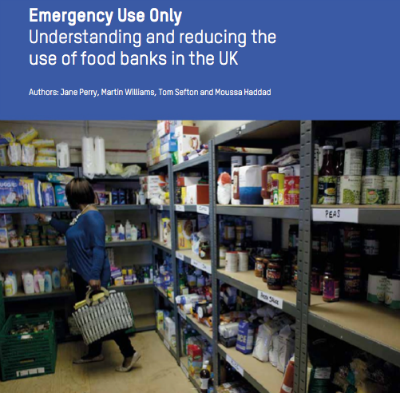Why people use food banks
Gaps in the social security safety net are a key reason why people are turning to food banks, according to the first in-depth study into the personal experiences of recipients of emergency food aid in the UK.
 The findings came in the Emergency Use Only report, jointly commissioned by Oxfam, Child Poverty Action Group, the Church of England and the Trussell Trust.
The findings came in the Emergency Use Only report, jointly commissioned by Oxfam, Child Poverty Action Group, the Church of England and the Trussell Trust.
The report interviewed 40 users at seven Trussell Trust food banks across the country to try to shed light on the factors that are driving food bank use in the UK.
These interviews were backed up by additional data collected from more than 900 recipients at three Trussell Trust food banks and an analysis of the cases of 178 clients accessing an advice service at one food bank.
The key findings from the research were as follows:
-
Food banks were predominantly a last-resort, short-term measure, prompted by an ‘acute income crisis’ - something which had happened to completely stop or dramatically reduce their income
-
Income crisis could be caused by sudden loss of earnings, change in family circumstances or housing problems. However, for between half and two thirds of the users from whom additional data was collected, the immediate trigger for food bank use was linked to problems with benefits or missing tax credits
-
19-28 per cent of users for whom additional data was collected had recently had household benefits stopped or reduced because of a sanction and 28-34 per cent were waiting for a benefit claim which had not been decided
-
Many food bank users faced multiple challenges, including ill-health, relationship breakdown, mental health problems or substantial caring responsibilities. Many were unable to work or had recently lost their job.
Use of emergency food aid in the UK, particularly in the form of food banks, has dramatically increased over the last decade. Figures from The Trussell Trust show that numbers receiving three days’ food from their food banks rose from 128,697 in 2011-12 to 913,138 in 2013-14.
The Government, which says there is no link between its welfare reforms and increased food bank use, said the report was inconclusive. It pointed out it spends £94bn a year in working age benefits.
That food banks are a politically divisive subject was a point highlighted in a resource created by the Joint Public Issues Team earlier this year.
Faith in Foodbanks helps churches explore issues raised by food banks, and to make connections between the work of these food banks and the life, worship and witness of local churches and fellowships.
The resource looks at why the number of food banks are growing, and provides Bibles studies, prayers and worship ideas.
Baptist Times, 28/11/2014